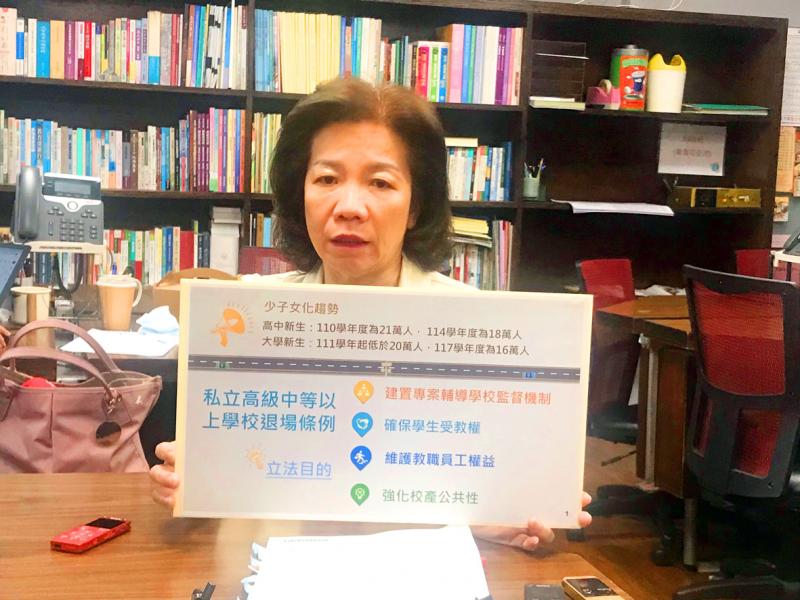The Executive Yuan yesterday passed a draft act to govern the closure of private schools, in a bid to address low enrollment caused by Taiwan’s low birthrate.
The act — which would apply to all private senior-high schools and universities that are struggling to survive due to low enrollment — would authorize the Ministry of Education to set up a fund to help them gradually cease operations; subsidize students’ education, accommodation and transportation expenses; and pay the salaries and insurance of faculty.
Premier Su Tseng-chang (蘇貞昌) told the weekly Cabinet meeting that the government expects some of these private educational institutions to encounter financial problems within 10 years, but that the act would ensure that their closures are smooth transitions.

Photo: Lin Hsiao-yun, Taipei Times
The act would also protect students in schools that are closing, he said.
Under the act, two categories of private schools would come under the ministry’s close scrutiny.
The first category is composed of schools “placed under alert” due to the schools having mild funding problems.
The second are schools that have severe funding problems — placing them beyond repair and requiring the ministry to give them special guidance.
The draft states that the ministry would establish the standards that determine whether an educational institution should be placed in the first or second category.
Schools in the second category would be announced to the public.
The draft states that if the institutions in the second category improve their financial situation within three years, they could be removed from the ministry’s watch list.
It states that if their finances fail to improve in three years, the ministry could order them to stop enrolling students.
Such schools should stop operations at the end of a school year.
Institutions in the second category to get its approval before finalizing procurement contracts of NT$1 million (US$34,701) or more, the ministry said.
Three faculty or staff members would be appointed to the school board to check whether the administration is truly working toward improving the institution’s financial situation, the ministry said.
The school board must be reformed after an institution stops enrolling new students, the ministry said, adding that the board would need to be composed of impartial third-party members who are assigned by the ministry so that they can assist with preparations for the closure of the institution.
The act would not require private schools to maintain a student body of 3,000 and would change the sunset clause, increasing the funding leading to closure, the ministry said.
More than 30 high schools and more than 10 universities have been placed on the first category list, Department of Technological and Vocational Education Director Yang Yu-hui (楊玉惠) said.
After the draft bill is passed by the Legislative Yuan, the ministry would release a list of schools that needs help for operation, she added.

A magnitude 5.6 earthquake struck off the coast of Yilan County at 12:37pm today, with clear shaking felt across much of northern Taiwan. There were no immediate reports of damage. The epicenter of the quake was 16.9km east-southeast of Yilan County Hall offshore at a depth of 66.8km, Central Weather Administration (CWA) data showed. The maximum intensity registered at a 4 in Yilan County’s Nanao Township (南澳) on Taiwan’s seven-tier scale. Other parts of Yilan, as well as certain areas of Hualien County, Taipei, New Taipei City, Taoyuan, Hsinchu County, Taichung and Miaoli County, recorded intensities of 3. Residents of Yilan County and Taipei received

Taiwan has secured another breakthrough in fruit exports, with jujubes, dragon fruit and lychees approved for shipment to the EU, the Ministry of Agriculture said yesterday. The Animal and Plant Health Inspection Agency on Thursday received formal notification of the approval from the EU, the ministry said, adding that the decision was expected to expand Taiwanese fruit producers’ access to high-end European markets. Taiwan exported 126 tonnes of lychees last year, valued at US$1.48 million, with Japan accounting for 102 tonnes. Other export destinations included New Zealand, Hong Kong, the US and Australia, ministry data showed. Jujube exports totaled 103 tonnes, valued at

BIG SPENDERS: Foreign investors bought the most Taiwan equities since 2005, signaling confidence that an AI boom would continue to benefit chipmakers Taiwan Semiconductor Manufacturing Co’s (TSMC, 台積電) market capitalization swelled to US$2 trillion for the first time following a 4.25 percent rally in its American depositary receipts (ADR) overnight, putting the world’s biggest contract chipmaker sixth on the list of the world’s biggest companies by market capitalization, just behind Amazon.com Inc. The site CompaniesMarketcap.com ranked TSMC ahead of Saudi Aramco and Meta Platforms Inc. The Taiwanese company’s ADRs on Tuesday surged to US$385.75 on the New York Stock Exchange, as strong demand for artificial intelligence (AI) applications led to chip supply constraints and boost revenue growth to record-breaking levels. Each TSMC ADR represents

TRUST: The KMT said it respected the US’ timing and considerations, and hoped it would continue to honor its commitments to helping Taiwan bolster its defenses and deterrence US President Donald Trump is delaying a multibillion-dollar arms sale to Taiwan to ensure his visit to Beijing is successful, a New York Times report said. The weapons sales package has stalled in the US Department of State, the report said, citing US officials it did not identify. The White House has told agencies not to push forward ahead of Trump’s meeting with Chinese President Xi Jinping (習近平), it said. The two last month held a phone call to discuss trade and geopolitical flashpoints ahead of the summit. Xi raised the Taiwan issue and urged the US to handle arms sales to